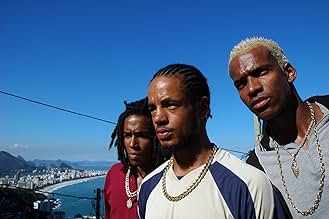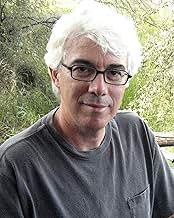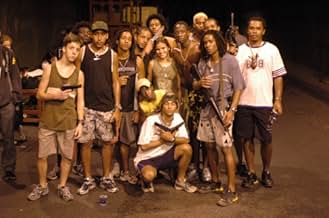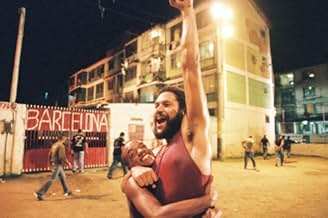CALIFICACIÓN DE IMDb
7.2/10
17 k
TU CALIFICACIÓN
Los mejores amigos Acerola y Laranjinha, descubren cosas sobre el pasado de sus padres desaparecidos que harán añicos su sólida amistad, en medio de una guerra entre bandas de narcotraficant... Leer todoLos mejores amigos Acerola y Laranjinha, descubren cosas sobre el pasado de sus padres desaparecidos que harán añicos su sólida amistad, en medio de una guerra entre bandas de narcotraficantes rivales de las favelas de Río.Los mejores amigos Acerola y Laranjinha, descubren cosas sobre el pasado de sus padres desaparecidos que harán añicos su sólida amistad, en medio de una guerra entre bandas de narcotraficantes rivales de las favelas de Río.
- Dirección
- Guionistas
- Elenco
- Premios
- 14 nominaciones en total
Naima Silva
- Camila
- (as Naíma Silva)
Eduardo 'BR' Piranha
- Nefasto
- (as Eduardo BR)
Opiniones destacadas
In the slum in Morro da Sinuca, a couple of days before turning eighteen year-old, Laranjinha (Darlan Cunha) tells his best friend and also orphan Acerola (Douglas Silva) that he misses his unknown father. Acerola decides to help his needy friend to find his father and they discover that he is in prison convicted for killing a man during a robbery and near to be released on parole. Meanwhile, Acerola's wife and babysitter Cris (Camila Monteiro) is invited to work in São Paulo and she sees the chance to raise money to buy a house of her own; she tells Acerola that he must take care of their son Clayton alone for one year. When the owner of the hill and Laranjinha's cousin Madrugadão (Jonathan Haagensen) is betrayed by his right-hand Nefasto (Eduardo BR), he is expelled from the slum and Laranjinha and Acerola have also to leave the hill. While Madrugadão plots a plan to invade and recover the hill with the support of the gang of the drug lord from Morro do Careca, Acerola and Laranjinha unravel the past of their fathers.
"Cidade dos Homens" follows the success of "Cidade de Deus" showing the life in one of the slums of Rio de Janeiro through the personal drama of the two lead teenagers, having as background the war between the rival gangs. The story is very realistic and the cast is amazingly natural in their performances, therefore the work of the writers and the director Paulo Morelli are awesome. The cinematography is also top-notch, with landscapes from the hill and well-choreographed and impressive action scenes in the slum. The producers certainly have an agreement with the real drug lords and owner of the hill to shoot this great movie. My vote is eight.
Title (Brazil): "Cidade dos Homens" ("City of the Men")
"Cidade dos Homens" follows the success of "Cidade de Deus" showing the life in one of the slums of Rio de Janeiro through the personal drama of the two lead teenagers, having as background the war between the rival gangs. The story is very realistic and the cast is amazingly natural in their performances, therefore the work of the writers and the director Paulo Morelli are awesome. The cinematography is also top-notch, with landscapes from the hill and well-choreographed and impressive action scenes in the slum. The producers certainly have an agreement with the real drug lords and owner of the hill to shoot this great movie. My vote is eight.
Title (Brazil): "Cidade dos Homens" ("City of the Men")
"City of Men" is a companion piece to Fernando Meirelles' 2002 film "City of God," but it's a much different animal from the earlier film. Both are set in the slums of Rio de Janeiro, and both are about young men fashioning lives for themselves out of the only resources available to them. But whereas "City of God" was kinetic, angry and immediate, "City of Men" is more reflective and conventional, and it comes to a much more hopeful conclusion than the earlier film.
"City of Men" is by far the weaker of the two. The carefully crafted screenplay was full of the heavy themes and plot twists of a Shakesperean tragedy, but I found myself missing the unscripted, documentary-like feel of Meirelles' film. "City of Men" is about the absence of fathers, and about two friends who find themselves fighting on opposite sides because of deeds committed by their own dads -- sons literally inheriting the sins of their fathers. But the script is too often heavy handed, and the director, Paulo Morelli, chooses to communicate too much about the lives of these people through blunt exposition. We don't learn about them from what the actors playing them do or how they act, but rather through the lines they read, and we're almost always aware that they're reading lines.
Nevertheless, the acting is strong enough that I found myself caring for the two leads and fairly engrossed in how their stories turned out. Morelli isn't as accomplished a director as Meirelles, but the film is still well directed on its own more modest terms. If I didn't already have "City of God" to compare it to, I might have liked it even more.
Grade: B+
"City of Men" is by far the weaker of the two. The carefully crafted screenplay was full of the heavy themes and plot twists of a Shakesperean tragedy, but I found myself missing the unscripted, documentary-like feel of Meirelles' film. "City of Men" is about the absence of fathers, and about two friends who find themselves fighting on opposite sides because of deeds committed by their own dads -- sons literally inheriting the sins of their fathers. But the script is too often heavy handed, and the director, Paulo Morelli, chooses to communicate too much about the lives of these people through blunt exposition. We don't learn about them from what the actors playing them do or how they act, but rather through the lines they read, and we're almost always aware that they're reading lines.
Nevertheless, the acting is strong enough that I found myself caring for the two leads and fairly engrossed in how their stories turned out. Morelli isn't as accomplished a director as Meirelles, but the film is still well directed on its own more modest terms. If I didn't already have "City of God" to compare it to, I might have liked it even more.
Grade: B+
"Poverty, to be picturesque, should be rural. Suburban misery is as hideous as it is pitiable." Anthony Trollope
Whew! I'm out of breath following youth gangs in the favela of Rio as they fight for a city hill as if they were in WWII's Pork Chop battle. Machine guns rule; women do not (contrary to the stereotype of matriarchal Latin society). It may not be City of God, the frenetic precursor using two of the same actors, but it has the Battle of Algiers' claustrophobia, which had a better-appointed Kasbah yet the same feeling of people darting around corners to avoid ever present Death.
The two central characters, teenage boys trying to keep their friendship and families in tact while around them chaos rules, veer between themselves and annihilation as they fight off the temptation to carry weapons like their friends yet can't find a way to survive without guns. There is more, however, than just gang warfare because sub-textually director/writer Paulo Morelli identifies a root cause of the dislocationsabsentee fathers. (Heck, even the current Spiderwick uses this powerful ingredient.) Much of the film is dedicated to one of the boys finding his father and the other coming to terms with the murder of his. While the former is adequately explored, the latter could have used much more explanation for the boy's suddenly joining the gang's war. Could it have been the murder of his father? I can't tell you.
The requisite hillside shots of the Rio harbor help the figurative contrast between the rich Brazilian scenery and the squalor of the barrio. Both conditions, of course, help to emphasize the globally accurate distance between the have's and the have not's, a condition the present economic global downturn is exacerbating. City of Men is a city of all men, racing through the labyrinth of life trying to survive, and losing.
City of God is a movie that contradicts its name; City of Men is spot onGod help us.
Whew! I'm out of breath following youth gangs in the favela of Rio as they fight for a city hill as if they were in WWII's Pork Chop battle. Machine guns rule; women do not (contrary to the stereotype of matriarchal Latin society). It may not be City of God, the frenetic precursor using two of the same actors, but it has the Battle of Algiers' claustrophobia, which had a better-appointed Kasbah yet the same feeling of people darting around corners to avoid ever present Death.
The two central characters, teenage boys trying to keep their friendship and families in tact while around them chaos rules, veer between themselves and annihilation as they fight off the temptation to carry weapons like their friends yet can't find a way to survive without guns. There is more, however, than just gang warfare because sub-textually director/writer Paulo Morelli identifies a root cause of the dislocationsabsentee fathers. (Heck, even the current Spiderwick uses this powerful ingredient.) Much of the film is dedicated to one of the boys finding his father and the other coming to terms with the murder of his. While the former is adequately explored, the latter could have used much more explanation for the boy's suddenly joining the gang's war. Could it have been the murder of his father? I can't tell you.
The requisite hillside shots of the Rio harbor help the figurative contrast between the rich Brazilian scenery and the squalor of the barrio. Both conditions, of course, help to emphasize the globally accurate distance between the have's and the have not's, a condition the present economic global downturn is exacerbating. City of Men is a city of all men, racing through the labyrinth of life trying to survive, and losing.
City of God is a movie that contradicts its name; City of Men is spot onGod help us.
Following the cult Brazilian TV series "City of Men" (2002-2005), Acerola (Douglas Silva) and Laranjinha (Darlan Cunha), two orphaned, teenage street kids living in Morro da Sinuca (one of Rio's 800+ favelas), are now about to turn eighteen and face the issues of adulthood. Fatherhood -- in a social milieu where most kids grow up fatherless -- is the key theme here: Acerola is now a teen dad who has to take care of his baby boy when his teen wife moves to São Paulo to work as a babysitter; and Laranjinha is on the search of the identity of his unknown father, only to discover he's alive and is an ex-convict on parole. On the background, the violent, destitute, lawless, drug-gang controlled life in Rio's favelas.
A sort of mix of Fernando Meirelles' (co-producer here) "City of God" in visual style and "Oliver Twist" in spirit, one of the major problems of "City of Men" is its contrived plot solutions: we have to deal with Acerola's impossibly fast finding of Laranjinha's father whereabouts. And Acerola's grandmother ending up homeless and abandoned by her family (in the film's phoniest solution). And trafficker Nefasto suddenly changing sides in the gang war; and Acerola's one-chance-in-a-million spotting trafficker Fiel still alive, and the phony solution linking Acerola's and Laranjinha's fathers in the past, etc.
Director Paulo Morelli -- who made the practically unseen "Preço da Paz" and the insipid "Viva Voz", and directed some episodes of the "City of Men" TV series -- comes from the publicity world, and it certainly shows. His images are (too) soigné: the black bodies have a golden shine, with pearly sweat drops and blazingly white teeth. He adopts cinéma-vérité style (in the camera-work, dialog, performances), now de rigueur in films dealing with "stark realities". Oscar-nominated editor Daniel Rezende ("City of God", "Motorcycle Diaries") tries to keep things moving fast so we don't have time to think about plot holes and contrivances. Antonio Pinto's music is beautiful but inexplicably old-fashioned for a movie about teenagers. On a positive note, the sound design and effects are superb.
The cast -- most of them from the TV series -- is asked to do more of the same. Douglas Silva (Acerola) relies on his intuitive acting and his big, expressive fish face. Jonathan Haagensen (as drug lord Madrugadão) again acts with his pout and bare torso in his usual laid back bad-boy style, looking suitably stoned. Babu Santana does his usual scenery-chewing in a bit as a trafficker. Camila Monteiro, Luciano Vidigal (a sensitive actor with an impossible part) and others repeat their TV roles. Eduardo BR as Nefasto suggests a blooming talent; Rodrigo dos Santos as Laranjinha's father has a great movie face, and first-timers Pedro Henrique (Caju) and Naíma Silva (Camila) are sensitively directed. The best is Darlan Cunha as Laranjinha: no-nonsense, nonplussed, witty and resourceful, his deadpan acting is the essence of the "carioca cool".
But there's something bothersome about "Cidade dos Homens": it's hard to concentrate on Acerola's sex troubles or Laranjinha's unlikely instant attachment to his shady father (are Rio's street kids really this naive?) when characters like Caju (the dim-witted, glamor-seeking teenager who joins the drug gang) or those really original characters -- the teenage girls that have "upgraded" from "gangsta molls" to becoming gangstas themselves -- screamed for attention and development. The fact is it's weird to take "City of Men" for its face value, i.e. a buddy-buddy movie with the favela drug war on the background, though we all know ordinary life somehow always goes on even in the most violent, crude realities.
By focusing on the personal problems of Acerola and Laranjinha, director Morelli and writer Elena Soárez ("House of Sand", "Eu Tu Eles", lending a sensitive touch to what could have been a stolid buddy movie) choose to concentrate on plot and characters, using a lot of big close-ups of the kids' faces so we won't be distracted by the hellish favela background -- and yet the "background" jumps right on our laps. Poverty, segregation, racism, drugs, guns and violence, the absence of schools, hospitals, formal employment or government assistance, the dire conditions of life in the favelas that affect over one million people in Rio are, in fact, the cause of most of Acerola and Laranjinha's "personal" problems. Maybe one day we'll all be desensitized enough to take that sort of background as routine scenery, but not right yet.
"City of Men" has a major asset, anyhow: the final scene is lyrical, ingenious and filled with humor -- it's a great finale for the successful series that dared put on Brazilian TV favela teenagers as protagonists, teenagers who usually just show up in movies and TV (and, many times, and tragically, in real life) as traffickers, junkies, thieves or corpses.
A sort of mix of Fernando Meirelles' (co-producer here) "City of God" in visual style and "Oliver Twist" in spirit, one of the major problems of "City of Men" is its contrived plot solutions: we have to deal with Acerola's impossibly fast finding of Laranjinha's father whereabouts. And Acerola's grandmother ending up homeless and abandoned by her family (in the film's phoniest solution). And trafficker Nefasto suddenly changing sides in the gang war; and Acerola's one-chance-in-a-million spotting trafficker Fiel still alive, and the phony solution linking Acerola's and Laranjinha's fathers in the past, etc.
Director Paulo Morelli -- who made the practically unseen "Preço da Paz" and the insipid "Viva Voz", and directed some episodes of the "City of Men" TV series -- comes from the publicity world, and it certainly shows. His images are (too) soigné: the black bodies have a golden shine, with pearly sweat drops and blazingly white teeth. He adopts cinéma-vérité style (in the camera-work, dialog, performances), now de rigueur in films dealing with "stark realities". Oscar-nominated editor Daniel Rezende ("City of God", "Motorcycle Diaries") tries to keep things moving fast so we don't have time to think about plot holes and contrivances. Antonio Pinto's music is beautiful but inexplicably old-fashioned for a movie about teenagers. On a positive note, the sound design and effects are superb.
The cast -- most of them from the TV series -- is asked to do more of the same. Douglas Silva (Acerola) relies on his intuitive acting and his big, expressive fish face. Jonathan Haagensen (as drug lord Madrugadão) again acts with his pout and bare torso in his usual laid back bad-boy style, looking suitably stoned. Babu Santana does his usual scenery-chewing in a bit as a trafficker. Camila Monteiro, Luciano Vidigal (a sensitive actor with an impossible part) and others repeat their TV roles. Eduardo BR as Nefasto suggests a blooming talent; Rodrigo dos Santos as Laranjinha's father has a great movie face, and first-timers Pedro Henrique (Caju) and Naíma Silva (Camila) are sensitively directed. The best is Darlan Cunha as Laranjinha: no-nonsense, nonplussed, witty and resourceful, his deadpan acting is the essence of the "carioca cool".
But there's something bothersome about "Cidade dos Homens": it's hard to concentrate on Acerola's sex troubles or Laranjinha's unlikely instant attachment to his shady father (are Rio's street kids really this naive?) when characters like Caju (the dim-witted, glamor-seeking teenager who joins the drug gang) or those really original characters -- the teenage girls that have "upgraded" from "gangsta molls" to becoming gangstas themselves -- screamed for attention and development. The fact is it's weird to take "City of Men" for its face value, i.e. a buddy-buddy movie with the favela drug war on the background, though we all know ordinary life somehow always goes on even in the most violent, crude realities.
By focusing on the personal problems of Acerola and Laranjinha, director Morelli and writer Elena Soárez ("House of Sand", "Eu Tu Eles", lending a sensitive touch to what could have been a stolid buddy movie) choose to concentrate on plot and characters, using a lot of big close-ups of the kids' faces so we won't be distracted by the hellish favela background -- and yet the "background" jumps right on our laps. Poverty, segregation, racism, drugs, guns and violence, the absence of schools, hospitals, formal employment or government assistance, the dire conditions of life in the favelas that affect over one million people in Rio are, in fact, the cause of most of Acerola and Laranjinha's "personal" problems. Maybe one day we'll all be desensitized enough to take that sort of background as routine scenery, but not right yet.
"City of Men" has a major asset, anyhow: the final scene is lyrical, ingenious and filled with humor -- it's a great finale for the successful series that dared put on Brazilian TV favela teenagers as protagonists, teenagers who usually just show up in movies and TV (and, many times, and tragically, in real life) as traffickers, junkies, thieves or corpses.
The film City of Men is a fantastic Brazilian film. It's directed by the same creator of City of God and the City of Men TV series. Now, personally, I recommend you watch the TV series before watching the movie due to many flashbacks throughout the film. The TV series also adds more depth to the characters that add to the overall enjoyment of the film. The film is still set in the favelas in Rio, but instead of focusing on the gangs as in City of God, it focuses on two 18 year old boys. The film is similar to City of God, but with a more light-hearted feel to it. The film also has similar cinematography. Overall, I prefer City of God to this film, but it is a worthy follow up to a fantastic film. 9 stars out of 10 in relation to City of God, but as a film in general, compared to the majority of films created this would deserve 10 stars.
¿Sabías que…?
- TriviaJonathan Haagensen, Mumuzinho and Thiago Martins are some of the actors returning after Ciudad de Dios (2002), portraying new roles.
- ErroresWhen Camila is showing Wallace her hair and telling him where Ace is, a leg of the tripod holding the close up camera is visible on the right side in the wide shot of them.
- Bandas sonorasFlor E O Espinho
(uncredited)
Written by Nelson Cavaquinho, Guilherme de Brito and Alcides Caminha
Originally recorded by Paulinho Moska
Sung by Rodrigo dos Santos (Heraldo) in the shower
Selecciones populares
Inicia sesión para calificar y agrega a la lista de videos para obtener recomendaciones personalizadas
Detalles
Taquilla
- Total en EE. UU. y Canadá
- USD 325,131
- Fin de semana de estreno en EE. UU. y Canadá
- USD 130,579
- 2 mar 2008
- Total a nivel mundial
- USD 2,589,732
- Tiempo de ejecución
- 1h 46min(106 min)
- Color
- Mezcla de sonido
- Relación de aspecto
- 1.85 : 1
Contribuir a esta página
Sugiere una edición o agrega el contenido que falta


![City Of Men [Cidade dos Homens]](https://m.media-amazon.com/images/M/MV5BMTIyMzgyNTUyMl5BMl5BanBnXkFtZTcwMzQ2NTc3MQ@@._V1_QL75_UX500_CR0)

























